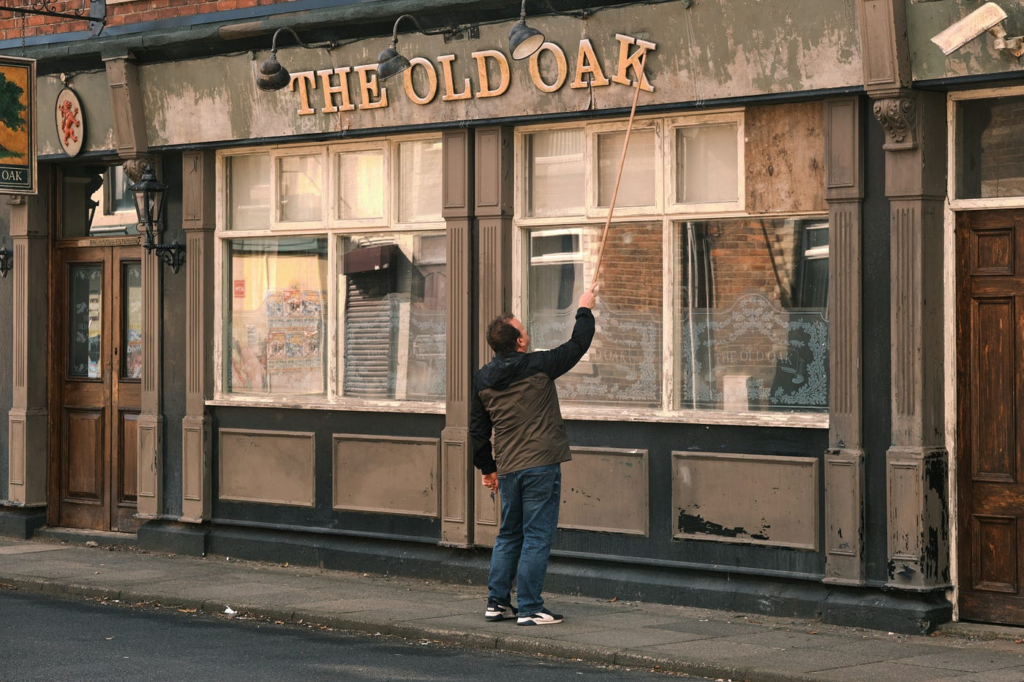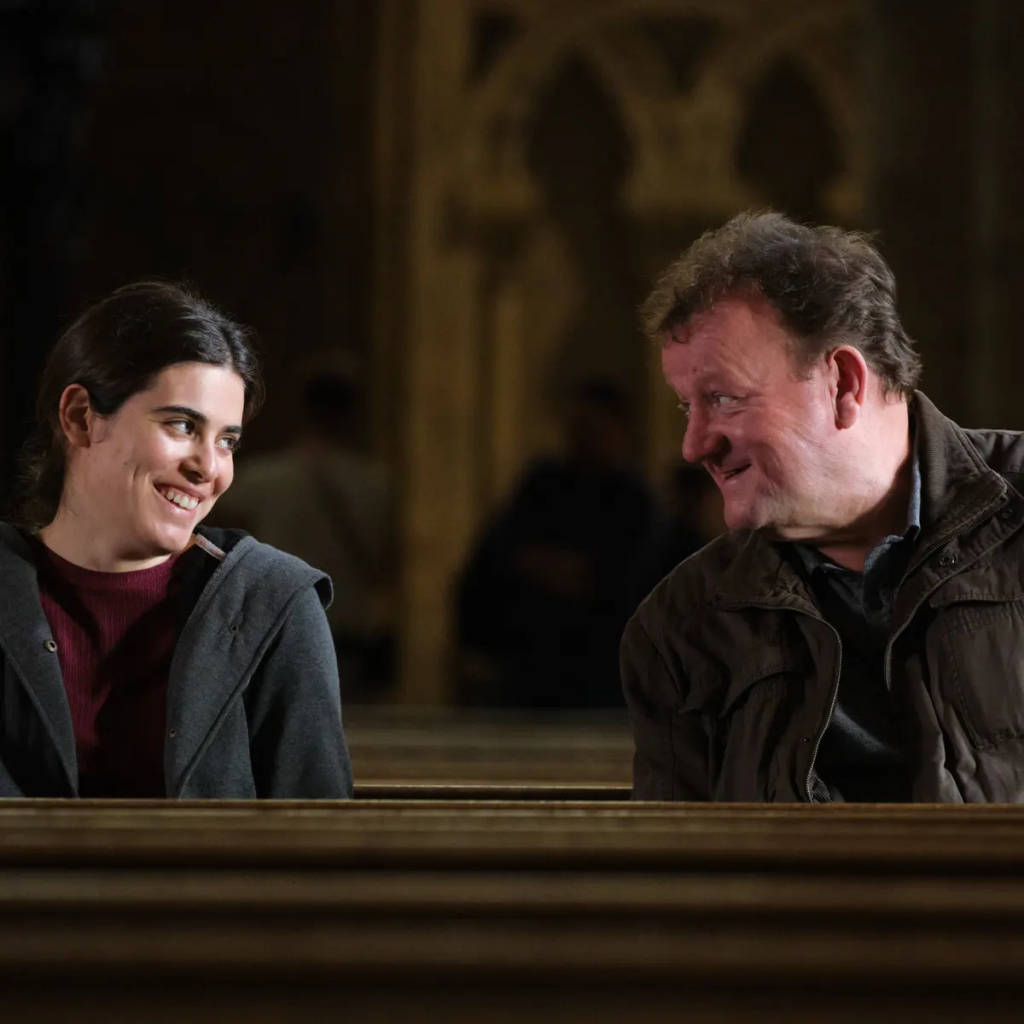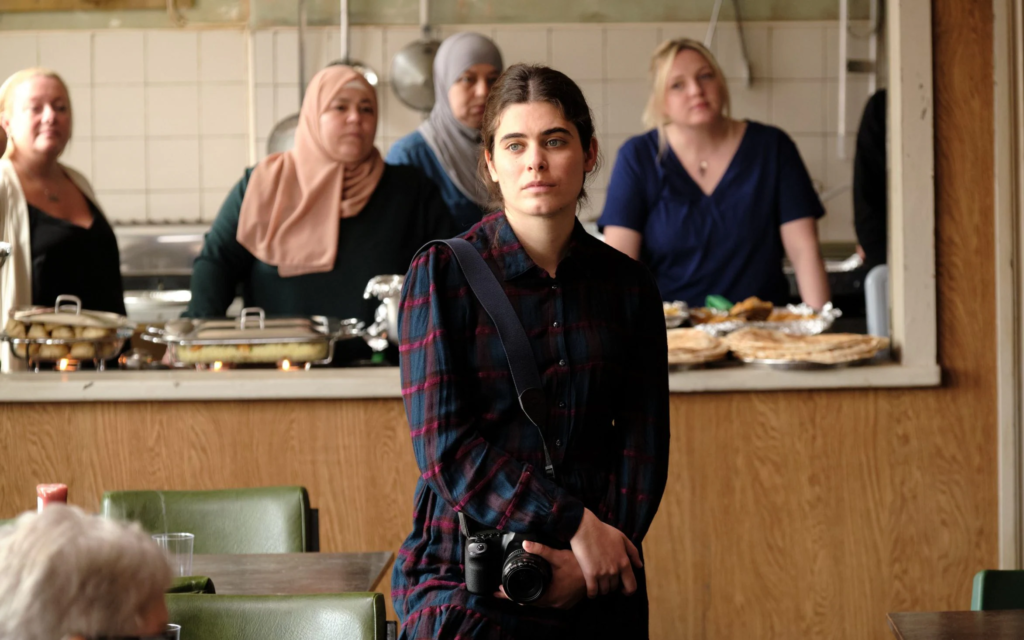Director: Ken Loach
Writer: Paul Laverty
Stars: Dave Turner, Elba Mari, Claire Rodgerson
Synopsis: The future for the last remaining pub, The Old Oak, in a village of Northeast England, where people are leaving the land as the mines are closed. Houses are cheap and available, thus making it an ideal location for Syrian refugees.
Ken Loach is the United Kingdom’s most steadfast social realist. He is, at his core, the master of documenting the working class. He understands their contradictions, their fear, and their material and psychological oppression. His position has always been that being poor is not a moral failure but being cruel is. The Old Oak is a distillation of his decades-long themes.
Set in a Durham mining town which has suffered years of neglect from the powers that be, the film explores blue-collar xenophobia. A Brexit Tory driven divided kingdom where people don’t know where to direct their resentment, disappointment, and social disenfranchisement.
When a group of Syrian refugees are housed in the town it creates a schism between the “locals” and the newcomers. The site of the battleground is TJ Ballantyne’s (Dave Turner) pub – The Old Oak and it’s also social media. Ken Loach and his regular collaborator Paul Laverty send out an ardent plea for empathy and openness.

It is 2016 and already the country is divided by the upcoming referendum. The film begins with angry voices – and via Robbie Ryan’s incredible cinematography, photographs of the people who are yelling. They are pounding at the windows of a bus wherein a group of traumatized and exhausted refugees are being dropped off to their new homes. The photographs are being taken by Yara (Ebla Mari) who, with her mother and three siblings, has made it out of the camps and has finally been granted asylum in the United Kingdom.
The rabble are shouting “You ragheads, you shot my mate in Iraq.” For the Durham locals the Middle East is a monoculture. Syria supported Iran at the time which tangentially made them allies to Britain. Their knowledge of the oppression faced by people under Bashar al-Assad is limited. For a mining town that has been perpetually screwed over by the Tories, and where many people live below the poverty line, solidarity is less important than when they will be able to buy a steak.
The Old Oak is the last public house. In many ways it is the final remnant of a dying community. Due to unscrupulous overseas investment conglomerates buying up the houses, the generational families are trapped in their terraces. There is little to no work and people can’t sell up and leave. They are victims of economic and social neglect. People who have known each other all their lives are fighting each other for scraps – and no one is winning. What they worked for so they would be secure has become a prison.
TJ is at heart a good man, but he is defeated and no longer brave. He has made mistakes, mostly stemming from increased depression and emotional absence. He lost his father to an offshore accident. His mother is gone. His wife and son are gone and although he loves his lad, he is hated by him. Friends have left. The only thing that keeps him going is the routine of caring for his beloved dog who rescued him in a time of desperation.
When Yara enters his life with her clear eyes and silent pain, he sees a kindred soul. Her camera was broken that first day by a hooligan and she needs to get it fixed. Not replaced but fixed. TJ realizes it has a particular meaning to her. It is the last thing she has of her father who was swept up by the secret police. He allows her into the closed off back room of the pub which was once the social and political hub for the miners and their families but has since fallen into disrepair.
Inside, there are pictures covering the history of the community. From the Easington Colliery tragedy to the 1984-1985 miner’s strike where everyone rallied together to ensure they could down tools and survive with no income. “When you eat together, you stick together” is a motto on the wall written by TJ’s mum. The principles died as the mine closed. Yara and TJ tentatively share their own “war stories.” TJ realizes that, along with his friend Laura (Claire Rodgerson) and his bartender Maggie (Jen Patterson), the pair can bring people together under the auspices of “Solidarity, not charity.”

However, in doing so TJ will risk estranging his regulars. If he loses the pub, he has nothing. TJ sees the grace that the Syrian community bring and their generosity considering they have nothing beyond a few cobbled together items they were able to keep while in the camps and charity donations he helps Laura deliver. Adversity taught them to share. Adversity has taught TJ to say “nowt.”
Little by little, members of the community embrace Yara with her honest concern for others. She helps Linda (Ruby Bratton), a pre-teen who is at risk of delinquency. Linda is mouthy and putting up a good front, but her home life is a shambles. When Linda passes out from hunger Yara takes her to her house. She is shocked to see that there is nothing in the cupboard and Linda’s diet is packets of crisps and cheap candy.
There are stalwarts who refuse to interact with Yara and the refugees. They are the drunken and nasty Vic (Chris McGlade), Eddy, Garry, and Charlie (Trevor Fox) – his friend since childhood. Charlie and TJ were “marra” (the mining term for the one who will forever have your back and ensure your safety). TJ has become the butt of jokes from Vic and the others, and he is watching Charlie airing his legitimate concerns about his future and that of his sick wife turn into group-think hatred.
When TJ decides to not open the back room for them to hold a community meeting about how they feel their town has become a dumping ground for what the toffs in Chelsea don’t want to look at – he makes a mistake. In their minds, he has turned traitor.
The fatal mauling of his little scrappy mutt, unexpectedly named Marra, reopens up his deep well of grief. Yara and Fatima (Anna Al Ali) bring him food. “Sometimes there is no need for words. Only food.” He feels ashamed. “There is no shame in loss, Mr. Ballantyne. We understand loss.”
Everyone in the film understands loss of some kind. A loss of confidence, connection, culture, and dignity. The people of the forgotten town have become beggars in their own country. When the spark of alliance reignites through a blending of the two communities via sustenance it is snuffed out by antipathy.
TJ takes Yara to Durham Cathedral – a wonder of Norman architecture and a farrago of evolving styles. The hymns of William Byrd and Thomas Tallis echo – and TJ explains just a small part of the history of the cathedral, a history which was created by the hands of stonemasons. Yara talks about the loss of her country’s history to ceaseless wars and occupations. Syria is nestled in the ancient cradle of civilization – “Built by the Romans, destroyed by the regime. When I see a place like this, I feel hope. When the world does nothing, that’s when the regime wins. It takes strength to hope. It takes faith to hope. I have a friend who calls hope obscene. Maybe she’s right. But if I stop hoping my heart will stop beating.”
Yara’s hope is her photographs. She documents the people of the village and shows that they are worthy of being seen. She shows images of Syria accompanied by music written and performed by Saied Silback. It is a moment of cinematic reflection from Loach whose films have seen him politically blacklisted in certain places or winning Palme D’ors and career honorariums.

Loach is a proletarian filmmaker who chooses non-professional actors to populate many of his films. He gets to street level in his contemporary work. By filming in real locations he has created an archive where the unseen are seen.
The Syrians honor their new neighbors by creating an intricate Miner’s Banner combining their heritages – the town is healing until a betrayal brings it tumbling down. TJ feels he has let people down by making promises he couldn’t keep. But it wasn’t him that broke the trust. A conversation TJ has with Charlie gets straight to the point. “Whenever our life goes to shit, we never look up, we only look down. Blame the poor bastards beneath us. It’s always their fault. That makes it easier to stamp on the poor bastards’ faces, doesn’t it?”
Yet, The Old Oak chooses not to judge the people but the system. Despite the misinformation and hatred being amplified in online echo chambers, there is offline shared humanity. There is camaraderie born out of looking into the eyes of people who are targets of mistrust and hatred and changing the point of view. Molly (Michelle Bell) goes from chasing Yara out of her home, to introducing her to women at a hair salon where she photographs the clients. Bashir (Yazan Al Sheteiwi), who was cruelly beaten at school where Max (Alex White) was a bystander, ensures the penitent lad has food from the Old Oak dining room.
At eighty-seven The Old Oak is expected to be Loach’s last film and completes a loose trilogy containing I, Daniel Blake and Sorry We Missed You. The Old Oak uses dialogue and stories given to Laverty and Loach and showcases a version of the Durham Miners Gala where the insults that opened the film convert into pride filled cheers.
The final signatures on Loach’s long petition for betterment are bold. Hope is not obscene. Hope is what will keep the heart of the United Kingdom beating. Shukran, comrade Loach. The Old Oak is an acorn seeding united growth.





